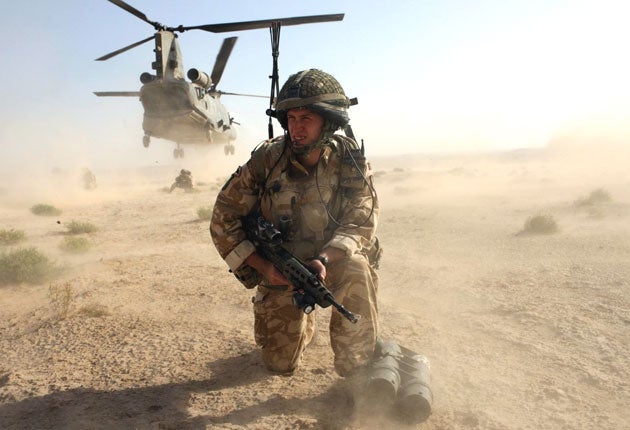Brigadier blames equipment failures for soldiers' deaths
Former officer accuses MoD of inefficiency and wastefulness

British soldiers fighting in Afghanistan and Iraq are being killed and injured because of inefficiency and wastefulness in getting the equipment needed to protect them, a former senior officer has claimed.
The accusations of lethal negligence come in a book written by Brigadier Bill Kincaid – who spent 19 years dealing with weapons acquisition for the Ministry of Defence – and published by the think-tank RUSI (Royal United Services Institute).
The charges made by Brig Kincaid come in the wake of several inquests in which the coroners stated that deaths of service personnel had been due to equipment shortage. They also follow the resignation of an SAS commander in Afghanistan, Major Sebastian Morley, in protest that troops' lives, as he saw it, had been lost because of the same inadequacies.
The Government insists many of the shortfalls in the field have been rectified and millions of pounds have been recently spent on programmes such as heavier armoured vehicles to counter roadside bombs and mines.
But the fact that this latest indictment comes in a publication from RUSI, which has strong links with the establishment, will fuel claims that not enough is being done for those fighting in the front line and that there are severe acquisition problems.
The Ministry of Defence yesterday asked the Treasury for an extra £3.7bn to cover the cost of operations in Afghanistan and Iraq. The MoD said the additional funding – which also covers the ongoing peacekeeping mission in the Balkans – included "significant levels of spending" on new equipment.
Of the extra money – which is over and above the MoD's annual budget – £2.3bn would be allocated to operations in Afghanistan and £1.4bn to Iraq.
In a scathing assessment of the process used at present, Brig Kincaid, former director of operational requirements at the MoD, says: "Some would call it a farce, and indeed if it were found in the pages of a novel or on the stage, it might be considered most amusing – the television programme, Yes, Minister, which portrayed the farcical side of government most brilliantly, leaps to mind. But defence is not a black comedy nor a stage farce – defence is far more important than that."
He states that the core culture in the acquisition field of the MoD is "delay- inclined, anti-innovative and lacking in firm leadership". That, he says, "continues to place the lives of UK servicemen at greater risk. I really feel they are being let down in certain vital areas."
In his book Changing the Dinosaur's Spots: The Battle to Reform UK Defence Acquisitions he argues that root-and-branch reforms are needed to tackle the bureaucratic mire that results in "vital equipment arriving in operational theatres many months, if not years, after front-line forces need it".
Brig Kincaid points out that there had been an astonishing delay of 30 years in a programme to replace armoured vehicles. The Government has, in the meantime, been forced to spend vast amounts on interim vehicles as bombs in Afghanistan continue to take their toll.
Other problems with equipment that have been reported in recent years include a fleet of eight Chinook helicopters, costing £259m, which had to be grounded for several years while they were adapted to allow them to fly in cloudy weather; new, lighter armoured vehicles had to be brought in to replace the too-heavy Challenger tanks; the entire Clansman radio system proved useless in the desert during an exercise in Oman in 2002 and SA80 assault rifles on the same exercise kept jamming because of dust.
Brig Kincaid, now the editor of the magazine RUSI Defence Systems, says recent research disputes the Government's claims of raising defence spending by 1.5 per cent. Inflation in the defence industry, according to these figures, is running at nearly 3 per cent.
The UK, nevertheless, spends about £35bn per year on defence, with nearly 40 per cent being spent on equipment acquisition and support. But Brig Kincaid claims "accountants' logic too often takes precedent over military logic". Unless that is changed, he says, "projects will continue to take over two decades from concept to fielding; leading to unnecessarily high cost, increasing waste and greater loss of lives".
"Most business people would agree 'time is money'," he writes. "Whitehall, however, acts as if time is of less importance than getting the process right – the reason cited being the need to safeguard the spending of public funds. While the latter is undoubtedly important, those charged with responsibility for this aspect do not seem to take into consideration the cost of delay."
The MoD said the book was "outdated and sensational". A spokesman said: "We are spending significant amounts on equipment for today's frontline and future operations; £5.7bn-worth of new equipment was delivered to our troops in 2007-08. That is not a small amount. We have substantially improved our procurement processes, and are now getting equipment from the concept stage to the front line in record time: the new Mastiff armoured vehicles offering unparalleled levels of protection and mobility were delivered to the front line in just 23 weeks."
Subscribe to Independent Premium to bookmark this article
Want to bookmark your favourite articles and stories to read or reference later? Start your Independent Premium subscription today.

Join our commenting forum
Join thought-provoking conversations, follow other Independent readers and see their replies